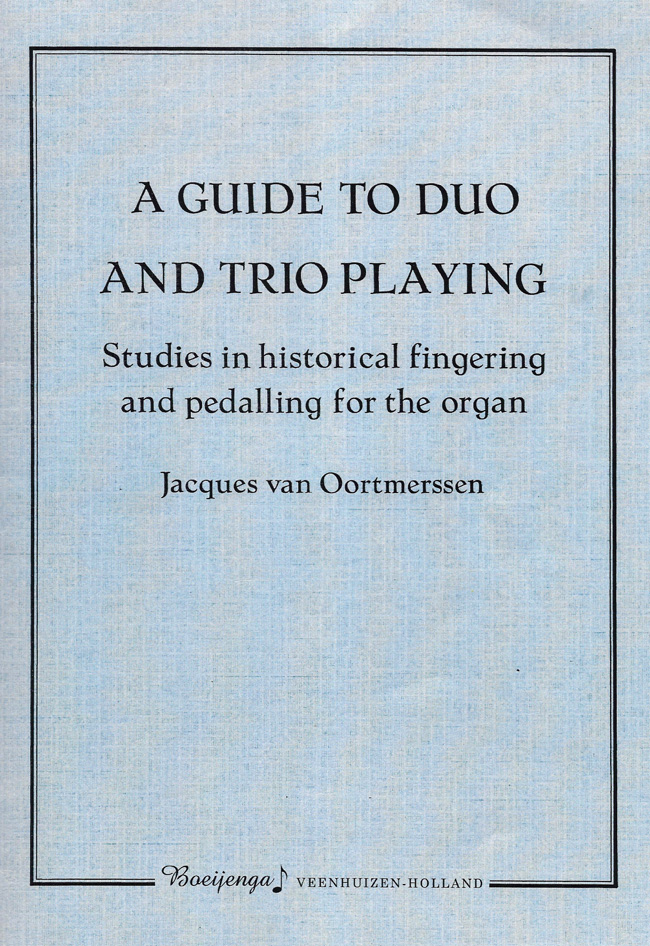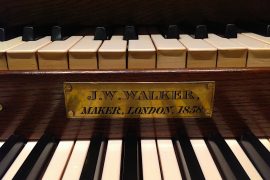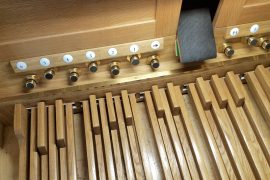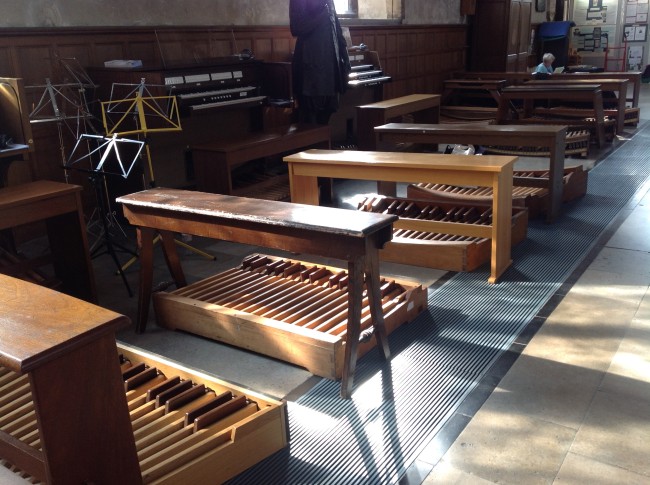You play the piano a bit, or you played in your youth, or someone’s heard that you accompany the children at school. Maybe you unwisely let slip that you secretly hankered after playing the organ. So you’ve been volunteered for playing the organ for a few church services, because the organist has fallen ill/left/died/we never really had one. Here’s how to survive the first weeks.
Welcome to our world
The organist gets none of the rapt focus and respect accorded to the concert performer, so be ready for this. Your powers of concentration will be sorely tested – hymns will be announced in the wrong order, verses subtracted at a whim, babies will wail, your final voluntary will be accompanied by the merry crash of the kitchen hatch opening and a rising hubbub of conversation, or worse, a prod in the back with ‘…could you stop playing for a moment, we’ve got an announcement to make about the Fun Run…’ Organists develop a rich fund of such horror stories, and you will be no exception.
It’s not a piano
You will quickly discover that the organ isn’t quite as friendly as a piano. There’s no sustain pedal to cover any infelicities in your legato, for starters. You can’t tickle the ivories in a bashful manner either. The organ is a big box of ON/OFF switches with nowhere to hide. ‘Learn to play loud’ was one of my first injunctions to self – and my teachers gave me the second which is learn to keep your hands close to the keys – big arm and hand movements might improve your Chopin, but on the organ they are a complete waste of energy and don’t change the sound one jot.
Whether you play at a tiny parish church or York Minster, accompanying hymns is a core organist task. Your job here is to KEEP GOING – and if maintaining a steady rhythm means a few wrong notes then so be it. Folk can cope with an occasional melodic or harmonic slip, but they are very uncomfortable with a jerky, hesitant accompaniment to their singing. Don’t even think about playing the pedals for hymns – this is actually one of the hardest skills to acquire because of the need to maintain a rock-steady pulse – if you’re fishing about for notes with your feet, the rhythm is bound to falter.
Get some help
Newbie organists are often told to join their local organists’ association, but this is a mixed blessing. Organists tend to be slightly more self-deprecating than other musicians (they have to be, the instrument doesn’t allow for hubris) but get them en masse and all the chatter about pipework, unfamiliar repertoire, let alone suggestions that you join a workshop on improvisation (improvisation!! WAAHH!!) can be very off-putting.
Find one friendly organist to come and show you, on your instrument, a couple of basic registrations (that’s which of the array of knobs/buttons/bells & whistles to press/pull/push for an individual piece of music). You want something medium-loud for hymns, and something softer for contemplative music during Communion, before a funeral etc. That’s all. Full Organ with Grand Tuba can wait – you won’t be playing the Widor for a little while yet.
Forget the pedals
Leave the pedalboard alone, along with any of the other intimidating levers, knobs, buttons and ratchets that might festoon the organ below waist level, until you get a bit braver, with a few services under your belt. When you get a bit of confidence, think about pulling out a pedal stop and adding a quiet tonic pedal note with your foot at the end of a piece (and claim historical precedence – French Classical organ music often does this).
Again, ask your friendly organist for advice – a pedal stop pulled at random can result in a sudden agricultural blare which will scare the pants off everyone, yourself included.
However if your instrument has what’s called a balanced Swell pedal (that’s something that looks like an outsize car accelerator pedal, in roughly the same position) push it with your foot as you hold down a few notes and see what happens. (Hint: it probably works on one keyboard and not the other.) It makes the organ louder or softer and can be quite useful.
It takes a while to master all this stuff and and stay unflustered at the console. So be patient with yourself.
What you can learn quickly is what music to play.
What music to play
As well as playing the hymns, you need to build up a little library of music to play while people come in, during Communion, after the service as the clergy go out and so on – known as VOLUNTARIES in the trade.
Don’t get out your piano music, except for baroque or early classical music that would probably have been played on harpsichord or organ anyway. As we know Bach’s music goes on anything, so if you already have something from the Bach Suites, the 48, etc, under your fingers, there’s your starter.
Be assured it’s not second-best or cheating not to play the pedals – there’s lots of real organ music written for manuals only. Big list below, and scroll down for readers’ suggestions.
Simple music played confidently is better than some tricky piece which ends up as a bit of a muddle. (True story: I once played the easy-peasiest Bach prelude from the Well-Tempered Clavier (the Ave Maria one in C) very loudly and quite fast at the end of a service. Several members of the congregation thought it was the Widor Toccata. I have since come to the conclusion that if you play anything loud and fast, someone will think it is the Widor Toccata.)
The organ can help you here: add those 4′ and 2′ stops your friendly organist has told you about, and the sound bulks out with octaves, harmonics and fillers to grand effect, without the need for complicated fistfuls of notes in each hand.
Work up half a dozen pieces and that’s enough to begin with. The same piece can sound quite different depending on the registration. I’ve had people say ‘You haven’t played that piece before!’ when I jolly well have, but this was the first time I’d added a sparkly 2′ stop to the registration. Church-goers also like familiarity, so if you keep at it you will start to hear ‘I love it when you play that piece!’ – which always gives a little glow.
Dealing with the downs
There is likely to be some crass member of the congregation who will come up just after you’ve finished playing your simple little piece to tell you with great satisfaction about the marvellous young man at a neighbouring parish ‘who got his FRCO at the age of 13 you know, and has just won an organ scholarship to Top College Oxford, and played the [insert name of very difficult piece here] at last week’s Evensong,’ – to which your response is either (a) to brain said crass member with a hymnbook or (b) run off to the choir cupboard and cry.
Same member of congregation may also like to point out your slips in the second hymn (like you didn’t know?) -but in a jocular fashion, so you can’t possibly take offence.
Um, could it be that you’ve just done something they couldn’t, and they are just a teensy weensy bit resentful? Jealousy is a sign that you’re getting something right, so keep calm and carry on – and maybe in similar jocund fashion, offer them the hymn sheet for next week.
The rest of the congregation will, if they think anyone is playing the organ at all (I’m sure some people think it plays itself), be deeply grateful that they are not having to sing along to a CD.
As an adult learner it’s hard to take this on board, but your mistakes don’t matter as much as you think they do. Until you’re a recitalist, recording artist, or taking some fiendish exam, you don’t need to play the game of perfect. Contemplation of our own inadequacies is a useful occupation occasionally, if it spurs us to write a practice timetable, or take a few lessons. But just before a service is not the moment. At this point you are the only organist they have, and therefore, the BEST organist they have. You are using what musical talents you have been given (however modest you think they are) to do something of great value for your church and congregation. You are maintaining the use of a musical instrument that would otherwise be silent, or even scrapped. You are being braver than all of them put together, lurking behind their hymnbooks. Go!
There have to be some rewards for all this. Well, if you’ve read anything I’ve written here over the years, you can see how the instrument and its music can grab you. Organists are interesting people as well, in spite of their geek tendencies (and I cheerfully include myself in the latter). Tell me how you get on.
MANUALS ONLY ORGAN MUSIC
• The JS Bach Short Preludes and Fugues (not to be confused with the Short Preludes and Fugues BWV 553-560 which have full pedal parts) are an excellent introduction to the Inventions or the Wohltemperierte Klavier, and were composed by Bach for this very purpose. They make good short service voluntaries – some are quite easy, others less so. Mine is a Peters Edition (Nr 200a), and you’ll probably find them catalogued under piano music.
• If you have already learned them on the piano, many of the movements of Bach and Handel’s suites transfer nicely to the organ. If you’re flicking through books of Bach’s more intimidating organ pieces, look out for Manualiter in the title, meaning playable on just the manuals (though this does not necessarily mean they are easy, of course).
• Anne Marsden Thomas’ Oxford Service Music for Organ series is excellent: compilations of short pieces graded for difficulty. Try the MANUALS ONLY Books 1 and 2 (and MANUALS ONLY Book 3 if you’d like a bit more of a challenge.) Published by OUP.
• Also published by OUP, is a graded anthology of 18th Century English Organ Music, edited by David Patrick. This charming and often quirky manuals-only music was written for English organs of the time, which didn’t develop pedals as we now understand them until the late 18th/early 19th century.
• David Patrick has his own sheet music publishing house FitzJohn Music Publications with lots more organ music marked manuals-only in the catalogue, which you can order online.
• Cesar Franck‘s L’organiste is a collection of 59 short works written in 1889 and 1890 for the harmonium, but often played on organ. He originally intended to produce 7 pieces for each note of the (chromatic) scale, but came to a halt in the middle of A flat. Download a public domain facsimile of the original edition published by Enoch (Paris) in 1892, here
• Some time ago, John Henderson published a listing of organ music for manuals-only for the Royal Schools of Church Music. It’s now rather out of date regarding prices and available editions, but it makes helpful reading all the same, for inspiration as to repertoire and composers. Download it here: Organ_music_for_manuals_only RSCM
• Clifton Editions have published 10 books in The Occasional Organist’s Survival Kit series, offering a range of classic organ repertoire re-arranged for manuals only (and occasionally slightly simplified). You still need a reasonable piano technique for many of them, but they are useful for the pianist asked to be organist at short notice.
• If you’ve found a promising composer, or piece, then look on IMSLP the public domain music library, and you may be able to download the music for free. (Not everything on IMSLP is playable – the facsimile editions of early music are of academic interest only, and some transcriptions are full of mistakes. However I’ve found Pierre Gouin to be useful and reliable as an editor.)
• I can’t get excited about many of the pieces in the huge number of Kevin Mayhew books of new music written for manuals-only organists. However their Essential Organist for Manuals was a life saver for me (particularly the very first piece in the book, which is a manuals-only transcription of Jerusalem). It’s also worth picking up some manuals-only anthologies of Wedding and Funeral Favourites, because, sooner or later….
feature image: Statue of angel in cemetery in Bielsk Podlaski, Poland, by Brosen






This sounds so familiar. My pianist brain prevents me from using the pedals properly, except perhaps for last notes, when I usually find that I’ve forgotten to set any sort of pedal registration anyway.
I end up tying my left-hand in knots to try to achieve some sort of legato. Having both hands firmly attached to the manuals (hopefully) also means that slick changes to registration mid-pieces are, at best, risk and generally impossible. However, my ability to hit the “General 4” thumb piston by accident is well-recorded, and dropping a hymn book on the manuals without hitting “Gen Can” beforehand.
For my now-occasional visits to the organ bench, I’ve managed with John Stanley voluntaries, and the Kevin Mayhew “… for manuals” books – these hymn preludes are often long enough for voluntaries, and can make useful post-gospel twiddles. For example: https://www.kevinmayhew.com/preludes-on-favourite-hymns-manuals.html
One advantage of being a pianist-cum-organist, is that I can use the piano for more modern hymns which would sound terrible on the organ. So “Sing of the Lord’s Goodness” got the full Brubeck treatment! The choir weren’t too happy with processing brisk in 5:4 time though …
It’s bad enough to expect the choir to process in 3/4 time…..
Boëllmann’s Heures Mystiques is a collection intended for use in church and written for harmonium, so is playable on manuals only – there are some beautiful pieces in the collection. There’s a facsimile of the original printing available from Kalmus (2 volumes) or it can be downloaded from IMSLP. Or the wealthier organist can buy the three-volume Barenreiter edition!
As well as such heavyweight works as the Grand Choeur Dialogée, Eugène Gigout wrote a lot for organists playing in parish churches, again scored for harmonium or manuals with occasional optional pedal. There’s a collection of 100 short pieces available on IMSLP.
C.H. Trevor’s collections of Old English Organ Music for Manuals (OUP, six volumes) are invaluable – I used these a lot when I started playing the organ many years ago!
Excellent, thank you Brian – I’ll look out the Boellmann and Gigout – not enough French music in my repertoire!
You can never have enough French music in your repertoire! I find it’s quite addictive. A member of the congregation recently asked me how I managed to maintain the right atmosphere during communion every week and my answer was, in essence, by playing French pieces! My first organ teacher when I was twelve used to rave about Guilmant – thirty years on, I can totally understand why.
I’d never thought of that Brian, but you’re right – French music just hits the spot during Communion. Time to learn some more.
Also highly recommended for pianists-to-organists is https://organistsonline.org/for_pianists/ on Philip Norman’s excellent ORGANISTS ONLINE website.
I will be putting a link on my website to this helpful site of yours. Don’t know why I hadn’t spotted it before!
Thank you Robert! – and I recommend Robert’s website http://www.volunteerorganist.com which has plenty more helpful stuff for the reluctant organist.
When the saxophone player in our jazz band announced his marriage, he asked me if I was willing to play organ in the church during the celebration. I said yes immediately. But very soon I realized how big the challenge was which I had taken on me……. Yes, the organ was familiar to me, but never played it before. I was an amateur jazz pianist. What gave me hope is that I got the chance to practice a lot in the months ahead.
The first time at the organ felt very intimidating: not 1 but 2 keyboards, pedals and register stops. Like stepping into a new dimension. I met the main organist, a very nice woman who was willing to help me finding my way. It was a revelation to discover all those different sounds. And quite soon I got excited about learning to play the organ. It was meant as an introduction, but I ended up getting a crash course from her, including the pedals.
The pieces I played were Wagner’s Bridal Chorus (of course !), Vivaldi’s Winter from The Four Seasons, a piece by Händel, and a jazz piece which I adapted to sound nice on the organ.
Of course I did not play without errors during the celebration. But I got away with it. The crash course and a lot of practicing were a life saver !
I should not forget to tell that it was the start of my fascination for the pipe organ ! ?
Of course Harrie! And well done. We can worry too much about playing the organ ‘properly’ – you’ve reminded us just what fun it can be, even as a beginner.
Some more public domain French music for manuals-only to download: Maitres contemporains de l’orgue (first published in 1912)
https://urresearch.rochester.edu/institutionalPublicationPublicView.action?institutionalItemId=4062&versionNumber=1
I’ve just reviewed the (manuals-only) organ music of Caleb Simper, published by Stainer & Bell – more here if you’re interested
https://www.theladyorganist.com/repertoire-revivals-caleb-simper/
Having grown up playing in the pews of the church in the evenings while my mother practiced the organ I love your humor and insight!
Thank you Brenda!
Another review I’ve just published – Easy Handel Music: Water Music, Fireworks Music etc:
https://www.theladyorganist.com/an-easy-handel-organ-album-from-barenreiter-edited-by-daniel-moult/
Gosh Morwenna! What a great website!!!!. I wished I’d discovered you years ago. I’ve registered with you now so I can get blogs (I hope). I’m definitely in the Reluctant Organist category, although I do love playing. I still get performance anxiety and I found your comments on that topic very insightful, hilarious, and dare I hope, helpful! I intend to apply them….such as remembering that there is no-one else putting their hand up to do the job, and I’m the only one actually available at that time on that Sunday! I started in a small rural church in NSW Australia and now play in a bigger church with a bigger organ. I cant find any distributor or retailer of organ playing shoes here in Australia. I’m doomed to pay more for the postage than the shoes!
I believe they would assist my pedal efforts greatly. I’m loving reading and re-reading all the links and I’ve just printed off the PEDAL ETUDE 1 to try out. Thanks so much for all of it. I look forward to learning more and more as time continues. I have a few funny stories of my own to tell about weddings! More later.
Thank you Joan!! Sorry to hear about the shoes… I always feel the little ritual of putting on my organ shoes is an important part of starting to play. Morwenna
Thank you for this great introduction. It makes me laugh, it is exactly like that, even more may be.
The organist died, then I played, then my wife played, then we divorced, then I play again and she played on a Big organ and a bigger church. Life is full of surprises and lessons.
Anyway , there are always joy to play organ music even in our little church which is still a part of the school.
If you’re after some new, accessible organ music, can I point you to my website? I’ve written over 40 new pieces for organ in a variety of styles. http://www.simonpeberdymusic.com
Just reading this…So if page is still open try Dom Gregory Murray “Interludes”….straightforward and easily played, they can even be “enlarged” in emergency by an enterprising bit of jiggery pokery improvisation!